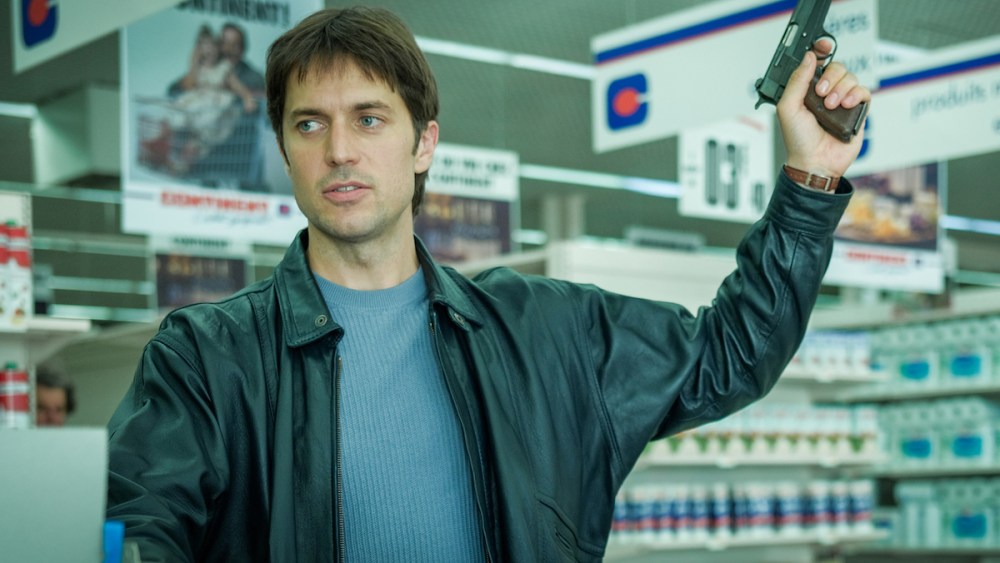Filmmaker Mélanie Laurent shrewdly sees “Liberty” as an introspective, tragic romance centered on one man’s objective and objective, relatively than taking the plain route of being action-heavy. , a fictional depiction of the prison misadventures of French burglar Bruno Soulak within the late Nineteen Seventies and early Nineteen Eighties. Her inventive instincts proved to be sound, albeit flawed, and never all that distinctive contemplating the existence of The Warmth, Thief, and a slew of different works that spanned related thematic territory. Whereas she and co-writer Christophe Deslanders hit the tone with environment friendly pacing and introduce fascinating angles that join the three protagonists, their spin on real-life occasions, exploring the psychology behind all these concerned, gives little Touching the floor makes its results severely diminished.
After we first meet rebellious mastermind Bruno (Lucas Bravo, who may very well be seen as a younger Gerard Butler), he is having intercourse together with his getaway driver girlfriend Anne (Léa · Luce Bussato) and his burly salesman accomplice Drago (Steve Tencher) work collectively to destroy the city’s grocery store for a marketing campaign. They made hundreds of thousands and lived out their lives in a French chateau, frolicking and lazing across the property in a sequence that was as poetic as a luxurious fragrance advert – filled with grit and mischief. They rationalize their unlawful conduct as stealing from the actual thieves: banks and grasping companies robbing prospects. Bruno’s well mannered manners, suave attraction and Côte d’Azur blue eyes have been key to the gang’s success as he beguiled and calmed his victims throughout the heist.
Nonetheless, their actions entice the eye of Detective Jorge Morreas (Ivan Attar), whose days catching petty criminals will quickly seem in his squad automobile’s rearview mirror. As fellow crew members Patrick (David Muggia) and Steve (Ladivoje Bukevich) trigger a commotion and their newest rip-off is revealed, they robbed France for an enormous insurance coverage coverage jewellery boutiques in all places, making his mission to arrest Bruno that rather more troublesome. However within the warmth of the day, Anne begs Bruno to quiet down and begin a household along with her. He’s compelled to resolve whether or not to surrender on a profession that has introduced him a lot happiness and wealth, or to proceed the cat-and-mouse recreation he began with George.
Initially, Laurent and Deslands arrange their characters, motivations and simmering conflicts with strong intelligence. Basically, they created a sly love triangle: Anne fell in love with unhealthy boy Bruno; Bruno loves the artistry of his work, a lot in order that he typically blurs the traces between trip and profession; George loves the joy of Bruno sending him on a chase, and since he likes to flee, he travels throughout the nation a number of occasions to catch him. Moreover, supporting characters like Patrick, Drago, and Steve all have memorable introductions, rounding out Bruno’s trendy band of merry males.
That is why it is shocking that the filmmakers did not correctly develop these characters’ journeys with the identical savvy as they did within the first act. Patrick’s harmful heroin behavior was a difficulty in a single scene after which by no means got here up once more, not as a result of he was kicked off the solid for turning into a legal responsibility or as a result of he received sober, however as a result of he was within the second act was forgotten by the filmmakers. Though Drago and Steve performed an integral position in Bruno’s life, they did their finest with restricted sources, however the inevitable farewell lacked sincerity. The antagonistic interactions between Bruno and George are additionally given quick shrift, missing in thrilling attraction and glossing over elements that may deepen their respective triumphs and losses (higher to painting George’s tireless mission and Bruno’s crafty sensibilities).
Fairly than letting the emotional resonance of an intimate dialog reverberate all through the body—a chat between Annie and Drago’s lovelorn girlfriend Marika (Leo Challi), musing on the resourcefulness required to be a gangster mistress—it which means takes a again seat. Though the movie begins and ends with Anne upending her universe by selecting a romantic accomplice, every part in between is decided fully by one man. Her solely illustration got here throughout a trip in Cannes, when she found that Bruno was searching for one other job. Nonetheless, her suspicions are unfounded, which not solely feels dishonest to the character, but in addition to the viewers.
Bravo, who might solely trace at potential main man attraction via a supporting position in Emily in Paris, flexed his antihero muscle mass with impish attraction. He brings out a mischievous aspect to his character’s boastful character and a coronary heart behind his energy. Bussato’s position is miserably underwritten, and consequently, the actress is usually overshadowed by Bravo and Attal, who brings a wit and lightness to his dirty police chief. The chemistry between the boys is strong, finest exemplified by the watered-down homage to the Pacino/De Niro restaurant scene in The Warmth.
Laurent would not waste any time visually spoiling our opening scene along with her heroine, rotating the digicam counterclockwise to recommend that her world is turned the wrong way up. This swirling theme is repeated later, linking the dizzying heights reached by the bandits to the dizziness of their impending collapse. It is disappointing, contemplating how Laurent and Deslands created progressive, clever heroines in movies like “The Undertake” and “Girls’s Ball” that the identical emotional sensitivity is not used To create a plump lady. It seems like ladies are imprisoned by this narrative, searching for a freedom that these filmmakers are unwilling to grant.

